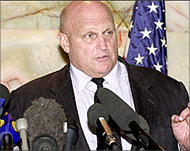Iran dismisses US plea on al-Qaida
Iran has said it will not share its intelligence on al-Qaida with the US and that it needs to see “practical steps” before considering resuming dialogue with Washington.

“We don’t have any relations or links with the US or its security services. So there is no reason to cooperate with them by giving them information,” government spokesman Abd Allah Ramazanzadeh told reporters on Wednesday in the capital Tehran.
The United States has demanded Iran should turn over detained senior members of al-Qaida, but Iran has said the men – whose names have not been disclosed – could be tried in Iranian courts.
Ramazanzadeh told reporters that Iran may “never” reveal the identities of its detainees and later clarified that “we have no programme to announcing their names”. “It depends on our national interests,” he added.
Extradition
Iran last week identified to the UN Security Council more than 200 suspected al-Qaida members it said had already been extradited to their countries of origin.
 |
|
Armitage raised the possibility of |
But the identity of those still being held had been the subject of intense speculation -diplomatic sources and Arab press reports had pointed to the possible presence in Iran of the movement’s spokesman Sulayman Abu Gaith and its number three, Saif al-Adl, as well as Usama bin Ladin’s son and heir to the network, Saad.
Iran has acknowledged that a number of top al-Qaida figures have been detained in Tehran, but has refused to give any hints as to their identities.
Ramazanzadeh also responded to comments by US Deputy Secretary of State Richard Armitage, who on Tuesday said Washington may hold limited talks with Iran – included into an “axis of evil” by US President George Bush.
“We are expecting practical steps by the US. You can’t threaten from one side and block our assets… and then request discussions,” Ramazanzadeh said.
Practical steps
“We have to see practical steps,” he emphasised. “The discussion here is what the US will do in practice in order to gain our trust.”
First and foremost, Ramazanzadeh said the US “should stop accusing us”.
|
“You can’t threaten from one side and block our assets… and then request discussions” Abd Allah Ramzanzadeh, |
“They have levelled false accusations against us one too many times. They have to put a stop to it,” he said, even though he asserted that Iran’s “being or not being in an axis of evil has no meaning to us.”
He also repeated the demand that the US should release Iranian assets that were frozen after the 1979 Islamic revolution.
“These are practical actions in order to gain Iranian trust and so we have a justification to initiate talks,” Ramazanzadeh said.
Iran and the US cut diplomatic ties in 1980, following the hostage taking at the US embassy in Tehran.
In recent months, Washington has accused Iran of harbouring and not arresting al-Qaida operatives, undermining the Middle East peace process and meddling in post-war Iraq.